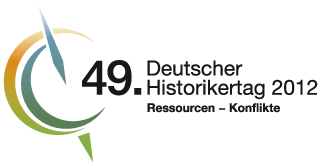Social Conflicts and Internationalism in the Twentieth Century: towards a Transnational History of Social Movements
Zeit: 28.09.2012, 15:15 - 18:00Ort: P 3
Kategorie: Neuere/Neueste Geschichte
Sektionsleiter/in: Stefan Berger
Abstract:
Social movements have been at the heart of some of the major turning points of twentieth-century European history, such as the Russian revolution of 1917, the European revolutionary turmoil at the end of the First World War, the student revolts of 1968, the Prague spring of the same year, and the ‘velvet revolutions’ (Timothy Garton Ash) in Central and Eastern Europe during the years 1989/90. In this panel we have selected some of the traditional social movements, such as socialist and communist movements, and some of the new social movements, such as the feminist movement, the ecological movement and the peace movement to see which junctures of twentieth-century history were influenced by them and in what ways.
Especially during phases of historical structural change, social movements were vital in deciding conflicts surrounding access to important political, social, economic and cultural resources. As central ingredient of wider civil societies, social movements enabled political action in a variety of different spheres and helped to regulate societal conflicts. The panel will discuss in which way a diverse set of social movements were able to set political agendas in order to empower groups within society to gain access to diverse sets of resources. It will be important to situate those struggles in the context of the Cold War and the wider conflicts between Communism and anti-Communism that dominated much of twentieth century history and ask about the role of internationalism in this transnational conflict.
The history of social movements has been booming in many different parts of the world for at least two decades now. It is, however, a sign of the continuing power of the national paradigm in historiography that much of this research has been concerned with social movements within national contexts. The aim of this panel is to move beyond such national perspectives and ask about the role of internationalism in the formation and development of diverse social movements.
Furthermore, it seeks to connect the history of the socialist and communist movements as social movements to the history of some of the most powerful ‘new’ social movements, such as the peace movement, the women’s movement and the ecological movement. All too often, historians have treated ‘traditional labour history’, involving the study of socialist and communist movements, as separate from the study of ‘new’ social movements. However, as this panel seeks to demonstrate, there is merit in studying the new social movements in the context of a more longue durée history of social movements comprising traditional working-class organizations on the left of the political spectrum.


